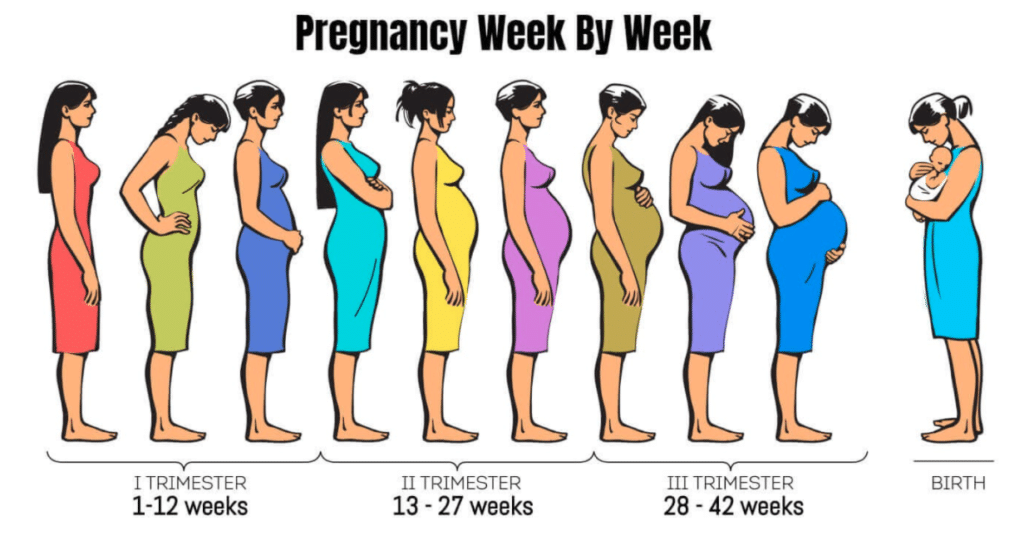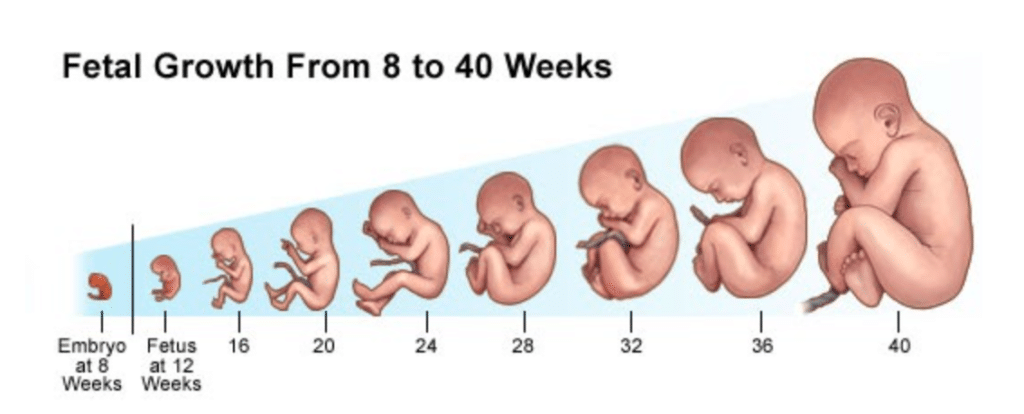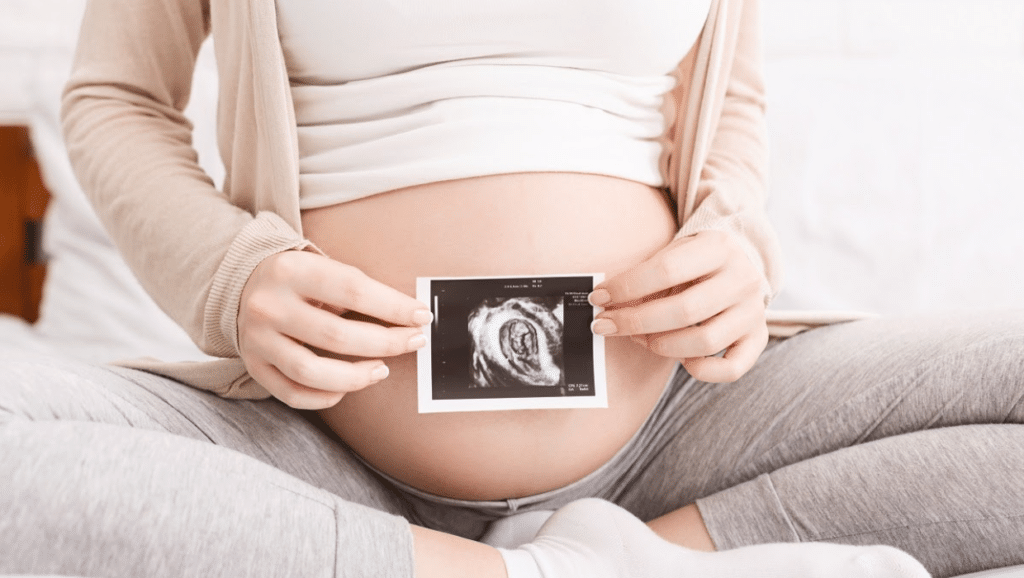Pregnancy is an exciting time and a big life change with so many new experiences. Your body will go through so many transformations over the next 9 months as it grows new life. A full-term pregnancy is 40 weeks and can range from 37-42 weeks – that is why we say your “birth month”! With each trimester you will notice a variety of different symptoms and physiological changes. It is very common you feel anxious – this is usually caused by all the unknown – let’s look at each trimester and what you can expect.

First trimester
Your first trimester starts with the first day of your last normal period (0-12 weeks). During your first trimester you may not look pregnant but your body is going through so many changes! Some common symptoms in the first trimester:
- Fatigue
- Sore Breasts
- Morning sickness
- Headaches
- Constipation
- Food Cravings or aversions
During the first trimester your hormone levels change a lot and your uterus begins to support the growth of the placenta and the fetus. During this time you may notice your heart rate increases – this is due to all the extra blood supply in order to carry oxygen and nutrients to your baby.
It is very important to take all your prenatal vitamins during your pregnancy, especially during the first trimester as this is a vital time for the development of your baby and all their organs. By the end of your first trimester your baby will have developed all its organs and weighs a full half-ounce – around the size of a lime.
What to expect:
The first test done will likely be an at home pregnancy test – from there you will call your health care provider to book an appointment – this usually happens around 6-10 weeks (after your last period). At this appointment they may confirm your pregnancy with a urine sample or blood tests, you may have a panel of blood work ordered to check all your levels and indicators on the health of the baby – sometimes you will just be scheduled for an ultrasound around 8-10 weeks. At this appointment the doctor or ultrasound technician will check your baby’s health and sometimes you will be able to see or hear a heartbeat!
Things to Consider
Now is the time to lower your caffeine consumption – moderate consumption is okay (less than 200mg) avoid soft cheeses, deli meat, raw fish, and no smoking. During your first trimester it is a great time to look at community support, register for some classes, and start thinking about your pregnancy and childbirth.

Second trimester
Woohoo you made it to your second trimester – for most this is the most comfortable time. Your second trimester is from weeks 13-27. You will begin to notice your first trimester pregnancy symptoms usually subside, you will likely feel like you have more energy and your baby bump may start showing! Now is a great time to start purchasing maternity clothing and share the exciting news with your family and friends. During your second trimester your baby will grow from the size of a lemon to a head of lettuce – weighing almost 1.9 pounds by 27 weeks.
Common Symptoms:
- Leg Cramps
- Heartburn
- Increased vaginal discharge
- Dizziness
- Skin Changes
- Backaches
- Nasal Congestion
During your second trimester you will likely feel your first baby kicks – this usually happens around 18-20 weeks. Some screening tests may be performed, it is best to talk to your healthcare provider about your family and medical history to see if there is anything that could put you or your baby at risk – your healthcare provider will be able to give you their best recommendations.
An anatomy ultrasound will be performed between 18-22 weeks! This ultrasound measures parts of your baby’s body – this is also when you can find out the gender of your baby if you want – just let your doctor know prior if you would like to find out or not.
Around 26-28 weeks you will be tested for gestational diabetes – this test is usually done at your health care providers office
Most Mamas feel the best during their second trimester
Third Trimester
You are almost there! The third trimester is from the 28th week until your little one is born.
During this trimester you will be seeing your healthcare provider more frequently.
Normal Test:
- Check your blood pressure
- Listen to fetal heart rate
- Urine tests to check for protein
- Measure fundal height
- Assess for hand and feet swelling
Common symptoms:
- Leg cramps
- Heartburn
- Backache
- Itchy skin
- Varicose veins
- Hemorrhoids
- Nausea

Around weeks 36-37 you will be screened for group B streptococcus – this is a simple swab done at your healthcare provider’s office. The swab is very similar to one of a pap test – your swab is then sent to a lab for evaluation. If you are group B positive you will receive antibiotics during labour to prevent your baby from getting it when passing through your vaginal canal. 1 in 4 women is group B positive.
Now is the perfect time to take a prenatal class – this type of class is designed to help prepare you and your partner for labour, delivery, what to expect, and postpartum. This is a great option to help you prepare your birthing “wish list” so you are educated and can advocate your wishes throughout the process. If you are able to, book a hospital tour (if planning a hospital delivery), know where parking is and familiarize yourself with the birthing center. If you are planning to breastfeed it is great to take a Prenatal Breastfeeding Class so you feel educated and ready!
Pack your hospital bag! This is an exciting time, but you do not want to feel unprepared when you go into labour. Pack your bag, your babies, and your partners and install the car seat into your vehicle. You will need to bring your car seat to the hospital with you – so it is a good idea to have the base and car seat ready to go around 36-37 weeks.
Remember – they call it your birthing “month”! A full-term pregnancy can last anywhere from 37 to 42 weeks. This is because your “due date” is really just an estimate of delivery.
Expecting? Book a session with Antea Corluka!
You got this mama!
